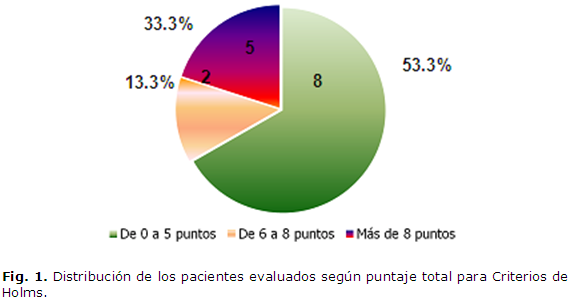Clinic genetic characterization of Prader-Willi syndrome
Keywords:
Prader-Willi syndrome/etiology/diagnosos/genetics, Nervous system/growth & development.Abstract
Introduction: Prader-Willi syndrome is a genetic disorder caused by deleted or unexpressed genes contained in 15q11-q13 region of paternal chromosome. Objective: to describe clinical and genetic characteristics of patients with Prader-Willi syndrome.Material and method: a descriptive, cross-sectional study was conducted in 15 patients with Prader-Willi suspect, who were referred to the provincial office of Clinical Genetics during 2013. As clinical variables the diagnostic criteria of Holms were considered and as genetic variables, the results of chromosomal and molecular studies.
Results: female sex prevailed in 66.7%. Ages were between 3 and 41. Most frequent major criteria were troncular obesity and neurodevelopment retardation in 100% of the patients. The minor criteria more identified were: sleep disturbances and speech difficulties (66.7% each one). None of the cases presented chromosomal anomalies because of karyotype classification. Three patients (60%) presented deletion at 15q11-q13 region level, which was identified by hybridization in situ with fluorescence.
Conclusions: in the province a definitive diagnosis was delayed. A reassessment is required according to the clinical criteria during the different stages of life in order to achieve a definitive diagnosis. The presence of neonatal hypotonia and difficulties in feeding are associated elements to the diagnosis of 15q11-q13 deletion.
Downloads
References
1. ORPHANET. Sobre las Enfermedades Raras. [Internet]. ORPHANET; [citado 5 Sep 2013] Available from: http://www.orpha.net/consor/cgi-bin /Disease_Search.php?lng=ES&data_id=139&Disease_Disease_Search_diseaseGroup=S-ndrome-Prader-Willi&Disease
2. Medlineplus. Síndrome de Prader Willi. [Internet] [citado 5 de septiembre de 2013]; Disponible en : http://www.nlm.nih.gov/medlineplus/spanish/praderwillisyndrome.html
3. Yang L, ZhanG,DingJ,WangH,Ma D, HuangG,Zhou W. Psychiatric Illness and Intellectual Disability in the Prader-Willi Syndrome with Different Molecular Defects-A Meta Analysis. PLoSOne. [Internet] 2013; 8(8) Disponible en: http://www.ncbi.nlm.nih.gov/pmc/articles/PMC3743792/
4. Online Mendelian Inheritance in Man. PraderWilli Syndrome [Internet]. OMIM: Johns Hopkins University. 2013. [citado 5 Sep 2013]. Available from: http://omim.org/entry/176270
5. Taboada Lugo N, Lardoeyt Ferrer R. Criterios para el diagnóstico clínico de algunos síndromes genéticos. Rev Cubana Pediatr [Internet]. 2003; 75(1) [citado 24 de enero de 2014] Disponible en: http://scielo.sld.cu/scielo.php?script=sci_arttext&pid=S0034-75312003000100007&lng=es&nrm=iso
6. González Fernández P, Pin Arboledas G, Cabrera Panizo R. Síndrome de Prader-Labhart-Willi y apnea durante el sueño: A propósito de tres pacientes. Rev Cubana Endocrinol [Internet]. 2004 [citado 24 de enero de 2014]; 15(2): Disponible en: http://scielo.sld.cu/scielo.php?script=sci_arttext&pid=S1561-29532004000200006&lng=es
7. Rodríguez Vargas N, Martínez Pérez T, Martínez García R, Calvo Luaces V, Guerrero Guerrero L. Prader-Willi syndrome: Clinical report of two patients and literatura review. Rev Cubana Pediatr [Internet]. 2006 [citado 24 de enero de 2014] ; 78(1): Disponible en: http://scielo.sld.cu/scielo.php?script=sci_arttext&pid=S0034-75312006000100011&lng=es
8. Emerick JE, Vogt KS.Endocrine manifestations and management of Prader-Willisyndrome.Int J Pediatr Endocrinol [Internet] 2013 [citado 12 enero de 2014]; 1(14). Disponible en http://www.ncbi.nlm.nih.gov/pmc/articles/PMC3751775/
9. Driscol DJ, Miller JL, Schwartz S, Cassidy SB. Prader-Willi Syndrome. [Internet] Genereview [citado 5 de septiembre de 2013] Available from: http://www.ncbi.nlm.nih.gov/books/NBK1330/
10. Grechi E, Cammarata B ChiumelloG. Prader-WilliSyndrome: ClinicalAspects. J Obes [Internet] 2012 [citado 24 de enero de 2014] Available from: http://www.ncbi.nlm.nih.gov/pmc/articles/PMC3486015/pdf/JOBES2012-473941.pdf
11. Falaleeva M, Sulsona CR, Stamm S. Molecular Characterization of a patient presumed to have Prader-Willi Syndrome. Clin Med Insights Case Rep [Internet]. 2013 [citado Nov 2013]; 6: 79-86. Available from: http://www.la-press.com/redirect_file.php?fileId=4941&filename=3659-CCRep-Molecular-Characterization-of-a-Patient-Presumed-to-Have-Prader-Willi-.pdf&fileType=pdf

Published
How to Cite
Issue
Section
License
Authors who have publications with this journal agree to the following terms: Authors will retain their copyrights and grant the journal the right of first publication of their work, which will be publication of their work, which will be simultaneously subject to the Creative Commons Attribution License (CC-BY-NC 4.0) that allows third parties to share the work as long as its author and first publication in this journal are indicated.
Authors may adopt other non-exclusive license agreements for distribution of the published version of the work (e.g.: deposit it in an institutional telematic archive or publish it in a volume). Likewise, and according to the recommendations of the Medical Sciences Editorial (ECIMED), authors must declare in each article their contribution according to the CRediT taxonomy (contributor roles). This taxonomy includes 14 roles, which can be used to represent the tasks typically performed by contributors in scientific academic production. It should be consulted in monograph) whenever initial publication in this journal is indicated. Authors are allowed and encouraged to disseminate their work through the Internet (e.g., in institutional telematic archives or on their web page) before and during the submission process, which may produce interesting exchanges and increase citations of the published work. (See The effect of open access). https://casrai.org/credit/


